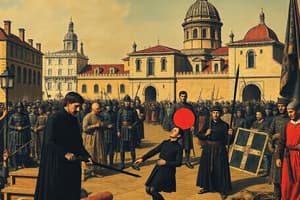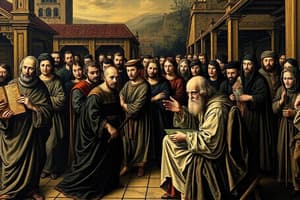Podcast
Questions and Answers
During the Renaissance, the Black Plague led to ______.
During the Renaissance, the Black Plague led to ______.
- A decrease in economic growth and power for wealthy merchants
- A strengthening of feudal society and religious institutions
- Increased social mobility and higher wages due to labor scarcity (correct)
- A decline in the importance of art and literature
The Black Plague weakened religious institutions during the Renaissance by ______.
The Black Plague weakened religious institutions during the Renaissance by ______.
- Increasing the power of religious leaders
- Promoting religious tolerance and unity among people
- Encouraging more people to join religious orders
- Causing a massive death toll and decreasing their influence (correct)
In the context of the Renaissance, which factor contributed to the rise of wealthy merchants gaining more power and influence?
In the context of the Renaissance, which factor contributed to the rise of wealthy merchants gaining more power and influence?
- The widespread adoption of Scholasticism over Humanism
- The increase in the power of religious institutions after the Black Plague
- The decline of feudal society due to labor scarcity (correct)
- The establishment of new trade routes through the Silk Roads
How did the Renaissance differ from the Middle Ages in terms of cultural growth?
How did the Renaissance differ from the Middle Ages in terms of cultural growth?
Which development during the Renaissance era contributed to setting the stage for new ideas and innovations?
Which development during the Renaissance era contributed to setting the stage for new ideas and innovations?
Which concept was more influential during the Renaissance period, Humanism or Scholasticism?
Which concept was more influential during the Renaissance period, Humanism or Scholasticism?
What was one significant impact of the Silk Roads on the Renaissance?
What was one significant impact of the Silk Roads on the Renaissance?
Which intellectual movement of the Renaissance emphasized logic and reason over emotion?
Which intellectual movement of the Renaissance emphasized logic and reason over emotion?
What was one key contribution of wealthy patrons like Lorenzo de Medici during the Renaissance?
What was one key contribution of wealthy patrons like Lorenzo de Medici during the Renaissance?
Which figure from the Renaissance believed in using any means necessary to maintain order and prosperity in a state?
Which figure from the Renaissance believed in using any means necessary to maintain order and prosperity in a state?
How did the trade routes along the Silk Roads contribute to cultural development in Europe during the Renaissance?
How did the trade routes along the Silk Roads contribute to cultural development in Europe during the Renaissance?
In Renaissance Italy, which family exemplified wealth accumulation and financial support for artists and scholars?
In Renaissance Italy, which family exemplified wealth accumulation and financial support for artists and scholars?
Study Notes
The Renaissance Era - A Time of Transition, Prosperity, And Cultural Expansion
The Renaissance was a period of great cultural growth and transition, taking place primarily between the 14th and 17th centuries. This era marked a significant shift from the Middle Ages and laid the foundation for the modern world. The term "renaissance" refers to the rebirth and revival of classical learning and culture. In this time frame, several key developments occurred, including advancements in art, literature, science, and technology, among others.
The Impact of the Black Death
The Black Plague played a crucial role in shaping the course of history during the Renaissance. This devastating disease swept through Europe starting from 1348, leaving cities virtually deserted and forcing people to reconsider their priorities. While the exact number of lives lost is uncertain, it's believed that nearly one third of Europe's population perished from the plague. As a result, labor became scarce, leading to higher wages for workers, which helped fuel economic growth.
In terms of societal changes, the Black Plague also led to increased social mobility, with wealthy merchants gaining more power and influence. Additionally, religious institutions were significantly weakened due to the massive death toll, further contributing to the decline of feudal society. These shifts set the stage for new ideas and innovations to take root during the Renaissance.
The Importance of the Silk Roads
Another critical factor influencing the Renaissance was the trade routes established along the Silk Roads, connecting Asia and Europe. Goods such as silk, spices, and precious stones were brought back to Europe by merchants who would often bring knowledge and ideas from distant lands. This exchange of goods and ideas helped stimulate cultural development across Europe, bringing influences from the Islamic, Persian, Indian, and Chinese civilizations. For instance, the arabic numerals we use today originated from this trade route.
Economic Growth and Wealth Accumulation
During the Renaissance, wealth accumulation became increasingly important, particularly among merchant families like the Medici of Florence. Their financial support allowed artists, architects, and writers to flourish and create masterpieces that have lasted until today. Additionally, wealthy patrons like Lorenzo de Medici played a crucial role in promoting humanism, ensuring that classical texts were translated into Latin so that scholars could study them.
Scholasticism vs Humanism
Two prominent intellectual movements emerged during the Renaissance: scholasticism and humanism. Scholasticism emphasized logic and reason over emotion, especially in the interpretation of texts, whereas humanism focused on individual experience, personal growth, and the potential for human beings to achieve great things. Both movements contributed to the development of critical thinking, which has continued to shape our society up to the present day.
For instance, Thomas Aquinas was a key figure in scholasticism, whose work greatly influenced Catholic doctrine. On the other hand, figures like Petrarch, Boccaccio, and Machiavelli championed humanism. Their influence extended beyond Italy, with notable philosophers like Descartes later drawing inspiration from humanist ideas.
The Legacy of Niccolò Machiavelli
Niccolò Machiavelli, born in Florence in 1469, stands out as a significant figure who embodied the spirit of humanistic thought. His most famous work, "The Prince," offers practical advice to rulers on governance and statecraft. While his ideas have often been criticized for being amoral, Machiavelli believed in using any means necessary to maintain order and prosperity in a state, particularly during times of political instability. Despite the controversy surrounding his work, Machiavelli's contributions continue to shape our understanding of political theory and governance.
Studying That Suits You
Use AI to generate personalized quizzes and flashcards to suit your learning preferences.
Description
Test your knowledge on the Renaissance era, a period marked by cultural growth and transition from the 14th to 17th centuries. Explore the impact of the Black Death, the significance of the Silk Roads, economic growth, the intellectual movements of scholasticism and humanism, and the legacy of Niccolò Machiavelli.




